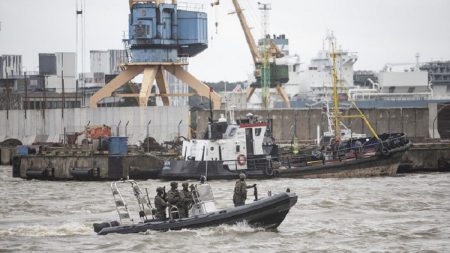The Canary Islands, located off the northwestern coast of Africa, have become an increasingly critical entry point for migrants seeking to reach Europe. Spain’s Interior Ministry has reported a record high of 41,425 migrant arrivals from West Africa through precarious means between January 1 and November 30 of this year. This figure represents the second consecutive year of explosive growth in migration numbers, surpassing last year’s total of 39,910 arrivals, which itself had set a new benchmark. The ongoing surge in irregular migration underscores persistent challenges faced by the archipelago and the broader European Union in managing migrants who often arrive under harrowing conditions.
The increased arrivals have significant implications for the Canary Islands. Migrants typically embark on perilous journeys in overcrowded, open-topped boats, which raise serious concerns about their safety and well-being. The use of such flimsy vessels significantly strains the islands’ capacity to manage the growing influx of individuals and families seeking a better life in Europe. Most migrants originate from countries such as Mali, Senegal, and Morocco. The geographical proximity of these nations contributes to the sustained migration trend, as individuals look for opportunities to escape difficult living conditions and pursue hopes of a more prosperous future.
European Border Agency Frontex has noted that the Canary Islands have experienced the fastest growth in sea arrivals within the entire European Union, even as overall irregular migration to Europe has been trending downward this year. This paradox highlights the unique challenges faced by the Canary Islands within the broader context of European migration, where some routes witness declines while others—particularly the Atlantic migration route—see marked increases. The decision by migrants to take on these treacherous voyages underscores the desperation and determination that often accompanies such life-altering journeys.
In light of the alarming migration figures, Spain has taken action by requesting the European Border Agency, Frontex, to reinstate air and maritime surveillance operations in key West African nations such as Mauritania, Senegal, and Gambia. These operations had been previously terminated in 2018, but the Spanish government is seeking to tackle the rising issue more effectively. This request indicates a proactive stance from Spain, emphasizing the need for collaborative measures among European and West African countries to address the multifaceted aspects of irregular migration.
Moreover, the Atlantic migration route poses significant risks. The journey across the rough seas can be fatal, with weak rafts, dinghies, and makeshift boats frequently capsizing. Reports from the first ten months of this year indicate that the perilous conditions of the Atlantic have led to tragic outcomes for many migrants. This ongoing crisis not only places the lives of those seeking migration in jeopardy but also raises pressing humanitarian concerns for those tasked with providing care and support upon arrivals in the Canary Islands.
In summary, the record number of migrant arrivals in the Canary Islands in 2023 reflects both an ongoing regional crisis and the humanitarian challenges posed by irregular migration. As Spain grapples with the implications of this trend, there is an urgent need for comprehensive strategies that involve enhanced collaboration with West African nations and heightened surveillance capabilities. The growing numbers arriving on precarious vessels serve as a stark reminder of the desperation faced by many and the perilous journeys they undertake in search of safety and opportunity in Europe.










